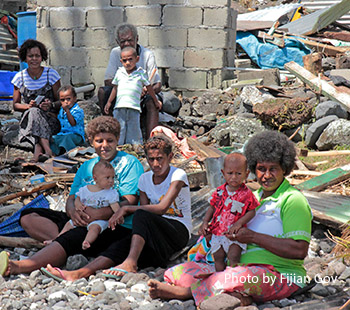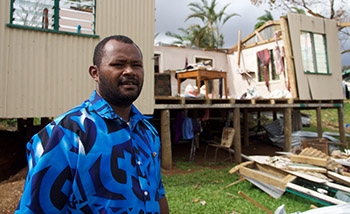 Cyclone Winston did not make a large impact on the news, but has devastated the Fiji islands. UNICEF reports that over 50,000 people are still in emergency shelters and many others are staying with relatives. With their homes completely flattened by the storm, they must remain in the centers until they can obtain some kind of temporary shelter to keep their families somewhat protected from the elements.
Cyclone Winston did not make a large impact on the news, but has devastated the Fiji islands. UNICEF reports that over 50,000 people are still in emergency shelters and many others are staying with relatives. With their homes completely flattened by the storm, they must remain in the centers until they can obtain some kind of temporary shelter to keep their families somewhat protected from the elements.
With category five winds, Cyclone Winston is the worst storm on record in the Southern Hemisphere. Thousands of families are homeless, electricity is still down in many areas, and basic services are suspended. With water sources contaminated by the storm, safe drinking water is an urgent need. As crops and gardens were destroyed by the winds and by salt water from the storm surge, access to emergency food is also critical during the next month.
ADRA Fiji is already distributing water, water purification tablets, food, and hygiene kits. Over the next month they will be distributing shelter kits so people can return to their homes and begin rebuilding their lives.
John’s Story
As told by ADRA’s Josh Dye
“At least I have free air conditioning now.”
Talk about looking on the bright side.
 John is a teacher from Navesau on Viti Levu. During the wild winds of Cyclone Winston, he lost his house. Not quite all of it, admittedly. Three of the four walls still stand and the floor is present. But the roof blew completely off, and is strewn across the rest of the village, invisible amongst the other roofs scattered around. One wall of his house lies collapsed on the ground. It looks like a bomb went off inside.
John is a teacher from Navesau on Viti Levu. During the wild winds of Cyclone Winston, he lost his house. Not quite all of it, admittedly. Three of the four walls still stand and the floor is present. But the roof blew completely off, and is strewn across the rest of the village, invisible amongst the other roofs scattered around. One wall of his house lies collapsed on the ground. It looks like a bomb went off inside.
He and his wife Dalcie along with their two-year-old daughter Gloria are staying in the kitchen of the partially flooded dining hall near his house. The hall usually serves hundreds of boarding students at the Navesau Adventist High School. The students have all returned home until the school reopens once the facilities are fixed. A week after the cyclone, the dining hall is still flooded. There is mud smeared all over the floor and part of the roof has come off. Shutters are broken and the wind howls through.
John’s house is completely unlivable. Wrecked appliances lie wasted on the floor amongst damp clothes and spoiled books – his wife’s precious library in ruins. Yet John remains remarkably upbeat.
“This is not too bad compared to those who lost family members,” he says. “All these books and tables and stuff can be replaced. Those families who lost family members – that’s beyond repair and our prayer is for them. But we can buy new books tomorrow and buy new tables and fix the chair. So I’m glad that we didn’t lose our life here in Navesau, and I thank God for that.”
With some clarity, John remembers running into the dining hall to shelter from the cyclone.
“It started at 3pm and went on for four, five, six hours. We were lying on the tables because the whole place was flooded.
“It was terrible, one of a kind. I could say I’ve never experienced something so devastating. Broken glass
Broken glass flying and the sound of rushing wind, all this corrugated iron… it was just a mixture of feelings going through my head. It was like in a movie, in a horror movie. Much more than that because I’m experiencing it first hand.”
With the danger now passed, John shows me around his house.
“I really don’t know how to describe it. It’s upside down if that’s a good way to describe it. It’s upside down. This used to be our home and it’s completely destroyed,” he says. “When the hurricane hit we just saved what we could – clothes on our backs, and a little bit of food here and there and just ran off for safety. I guess the hurricane came in a little bit earlier than predicted.”
The biggest needs right now, John says, are shelter and food. He’s optimistic about how long it will take to rebuild.
“If the materials are there and manpower, one, two or three months tops,” he says. “With the amount of damage in this area, yes I believe it will take that much time.”
Living in the dining hall is proving challenging, especially not knowing how long it will last.
“It’s quite difficult at the moment,” John says. “When it rains it doesn’t feel good, [or] when it’s sunny. I guess we need a home as soon as possible.
“But we’ll see whatever turns up and see how God provides.”
